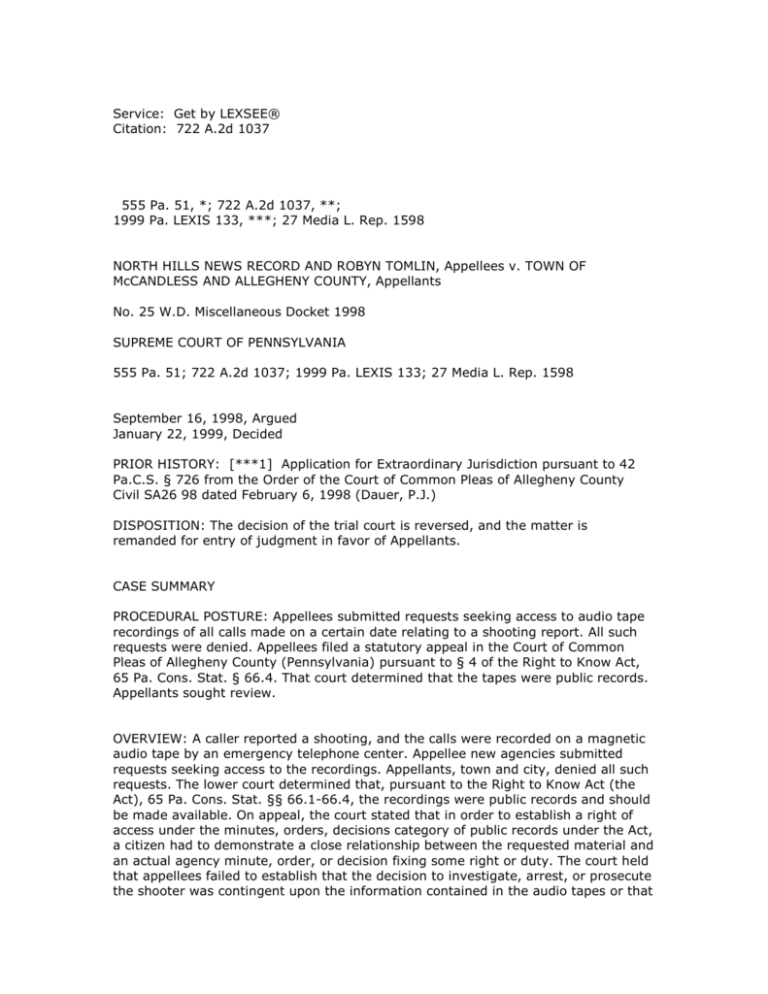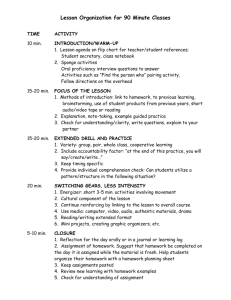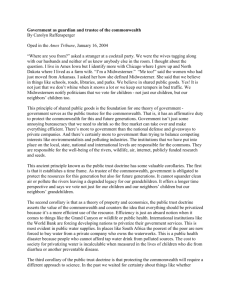
Service: Get by LEXSEE®
Citation: 722 A.2d 1037
555 Pa. 51, *; 722 A.2d 1037, **;
1999 Pa. LEXIS 133, ***; 27 Media L. Rep. 1598
NORTH HILLS NEWS RECORD AND ROBYN TOMLIN, Appellees v. TOWN OF
McCANDLESS AND ALLEGHENY COUNTY, Appellants
No. 25 W.D. Miscellaneous Docket 1998
SUPREME COURT OF PENNSYLVANIA
555 Pa. 51; 722 A.2d 1037; 1999 Pa. LEXIS 133; 27 Media L. Rep. 1598
September 16, 1998, Argued
January 22, 1999, Decided
PRIOR HISTORY: [***1] Application for Extraordinary Jurisdiction pursuant to 42
Pa.C.S. § 726 from the Order of the Court of Common Pleas of Allegheny County
Civil SA26 98 dated February 6, 1998 (Dauer, P.J.)
DISPOSITION: The decision of the trial court is reversed, and the matter is
remanded for entry of judgment in favor of Appellants.
CASE SUMMARY
PROCEDURAL POSTURE: Appellees submitted requests seeking access to audio tape
recordings of all calls made on a certain date relating to a shooting report. All such
requests were denied. Appellees filed a statutory appeal in the Court of Common
Pleas of Allegheny County (Pennsylvania) pursuant to § 4 of the Right to Know Act,
65 Pa. Cons. Stat. § 66.4. That court determined that the tapes were public records.
Appellants sought review.
OVERVIEW: A caller reported a shooting, and the calls were recorded on a magnetic
audio tape by an emergency telephone center. Appellee new agencies submitted
requests seeking access to the recordings. Appellants, town and city, denied all such
requests. The lower court determined that, pursuant to the Right to Know Act (the
Act), 65 Pa. Cons. Stat. §§ 66.1-66.4, the recordings were public records and should
be made available. On appeal, the court stated that in order to establish a right of
access under the minutes, orders, decisions category of public records under the Act,
a citizen had to demonstrate a close relationship between the requested material and
an actual agency minute, order, or decision fixing some right or duty. The court held
that appellees failed to establish that the decision to investigate, arrest, or prosecute
the shooter was contingent upon the information contained in the audio tapes or that
the information was an essential component of such decisions. Moreover, the tapes
were not closely related to the fixing of some personal right or property right and,
thus, simply were not the type of material contemplated as constituting a public
record pursuant to the Act.
OUTCOME: The court reversed the decision of the trial court, which held that audio
tape recordings of telephone calls made to an emergency response center were
public records under the Right to Know Act (the Act). The recordings were neither
minutes, orders, or decisions fixing rights or duties, nor bore sufficient association
with such forms of agency determinations as to require their disclosure under the
Act.
CORE TERMS: public records, tape, audio, voucher, fixing, minute, duty, emergency,
public record, disbursement, Know Act, emergency response, form of action,
telephone call, municipality, investigate, disclosure, killings, information contained,
requested material, public disclosure, property rights, actual agency, appropriately,
contingent, plurality, payroll, police department, tape recording, decisional
LexisNexis (TM) HEADNOTES - Core Concepts - Hide Concepts
Administrative Law > Governmental Information > Freedom of Information
HN1Section 2 of the Right to Know Act (the Act), 65 Pa. Cons. Stat. § 66.2, provides
generally that every public record of an agency shall, at reasonable times, be open
for examination and inspection by any citizen of the commonwealth of Pennsylvania.
Subject to enumerated exceptions, § 1(2) of the Act, 65 Pa. Cons. Stat. § 66.1(2),
provides that "public records" consist of the following two categories: 1) any
account, voucher, or contract dealing with the receipt or disbursement of funds by an
agency or its acquisition, use, or disposal of services or of supplies, materials,
equipment, or other property and 2) any minute, order, or decision by an agency
fixing the personal or property rights, privileges, immunities, duties, or obligations of
any person or group of persons. More Like This Headnote
Administrative Law > Governmental Information > Freedom of Information
HN2It is the burden of a party asserting a right of disclosure of materials pursuant to
the minute, order, decision category to establish that the requested material: 1) was
generated by an agency as defined in the Right to Know Act, 65 Pa. Cons. Stat. §§
66.1-66.4, 2) constitutes a minute, order, or decision, 3) fixes the personal or
property rights of some person or persons, and 4) is not protected by statute, order,
or decree of court. More Like This Headnote
Administrative Law > Governmental Information > Freedom of Information
HN3The commonwealth courts interpret the second and third requirements of the
minute, order, decision category of public records under the Right to Know Act (the
Act), 65 Pa. Cons. Stat. §§ 66.1-66.4, to include not only records that contain some
actual agency determination fixing rights or duties, but also the materials that form
the basis for such a determination and are the essential decisional components or
otherwise derive from the decision. Moreover, the commonwealth court construes
the term "fixing" to mean, more generally, "affecting." To constitute a public record
for purposes of the Act, a record need only reflect some form of action by an agency
that has an effect upon someone. More Like This Headnote
Administrative Law > Governmental Information > Freedom of Information
HN4In order to establish a right of access under the minutes, orders, decisions
category of public records under the Right to Know Act, 65 Pa. Cons. Stat. §§ 66.166.4, a citizen must demonstrate a close relationship between requested material
and an actual agency minute, order, or decision fixing some right or duty. More Like
This Headnote
JUDGES: MR. JUSTICE SAYLOR.
OPINIONBY: SAYLOR
OPINION:
[**1037]
[*53] OPINION
MR. JUSTICE SAYLOR
This Court invoked its extraordinary jurisdiction to determine whether an audio tape
recording of a telephone call made to an emergency response center must be made
available to citizens asserting a right to disclosure pursuant to the Pennsylvania Right
to Know Act.
On January 1, 1998, Michele Walker Keitel and Charles Dunkle were shot and killed
in Ohio Township, Allegheny County. A caller reported the shooting by telephone to
the Town of McCandless Central Emergency Telephone Center (the "Center"). The
Center was operated by the Town of McCandless ("McCandless") through its police
department and provided twenty-four-hour emergency telephone response services
to residents of McCandless, Ohio Township and [**1038] another neighboring
municipality. All calls to [***2] the Center's emergency number were recorded on a
magnetic audio tape.
Upon receipt of this telephone call, the Center notified Ohio Township's police
department, which, in turn, dispatched a patrol car, followed by emergency
personnel and equipment. Ultimately, Michele Walker Keitel's estranged husband,
William Keitel, was arrested in connection with the killings.
Appellees Robyn Tomlin and North Hills News Record submitted requests to
McCandless Township's police chief and solicitor, and later to the Allegheny County
District Attorney, seeking access to the audio tape recordings of all calls made to the
Center on January 1, 1998, relating to the killings. All such requests were denied.
[*54] Appellees then filed a statutory appeal in the Court of Common Pleas of
Allegheny County pursuant to Section 4 of the Right to Know Act, n1 65 P.S. § 66.4,
in which the Commonwealth sought and was granted leave to intervene. After
argument, the trial court determined that the tapes were public records pursuant to
the Act and should thus be made available to Appellees. In its opinion, the trial court
initially acknowledged that the plain language of the Act would not appear to require
disclosure [***3] of the tapes. Nevertheless, based upon a line of decisions from
the Commonwealth Court, it found that the tapes did indeed qualify as public
records. The trial court reasoned that:
- - - - - - - - - - - - - - Footnotes - - - - - - - - - - - - - - n1 Act of June 21, 1957, P.L. 390, as amended, 65 P.S. §§ 66.1-66.4 (the "Act").1
- - - - - - - - - - - - End Footnotes- - - - - - - - - - - - - [the coverage of the Act] is construed so broadly that it requires only that a record
reflect some form of action by an agency that has an effect on someone. Here, the
[audio tapes] formed the basis for the municipality's decision to investigate the
conduct of certain individuals with regard to their personal rights, privileges, duties
and obligations.
(citations omitted). Both the Commonwealth and McCandless lodged notices of
appeal in the Commonwealth Court, and the Commonwealth filed an emergency
petition in this Court seeking the exercise of extraordinary jurisdiction pursuant to
Section 726 of the Judicial Code, 42 Pa.C.S. § 726, and Pennsylvania Rule of
Appellate Procedure 3309.
In the Act, the General Assembly codified and [***4] clarified the common law right
of public access to public records. See Community College of Philadelphia v. Brown,
544 Pa. 31, 33, 674 A.2d 670, 671 (1996)(citing Wiley v. Woods, 393 Pa. 341, 350,
141 A.2d 844, 849 (1958)). HN1Section 2 of the Act provides generally that "every
public record of an agency shall, at reasonable times, be open for examination and
inspection by any citizen of the Commonwealth of Pennsylvania." 65 P.S. § 66.2.
Subject to enumerated exceptions, Section 1(2) of the Act provides that "public
records" consist of the following two categories: 1) "any account, voucher or contract
dealing with [*55] the receipt or disbursement of funds by an agency or its
acquisition, use or disposal of services or of supplies, materials, equipment or other
property," 65 P.S. § 66.1(2); and 2) "any minute, order or decision by an agency
fixing the personal or property rights, privileges, immunities, duties or obligations of
any person or group of persons." Id.
The first of these categories deals generally with fiscal aspects of governance,
providing for public review of accounts, vouchers or contracts "dealing with" receipts
of and disbursements by an agency. This Court's [***5] recent decision in Sapp
Roofing Co. v. Sheet Metal Workers' Int'l Ass'n, Local Union 12, 552 Pa. 105, 713
A.2d 627 (1998), concerned this accounts/vouchers/contracts category of public
records. In Sapp Roofing, a plurality of the Court held that a private roofing
contractor's payroll records, which had been submitted to the government in
connection with the performance of a public project, were public records under the
Act. Id. at , 713 A.2d at 629. n2 he Court reasoned that these documents qualified
as public records [**1039] "because they are records evidencing a disbursement by
the school district." Id.
- - - - - - - - - - - - - - Footnotes - - - - - - - - - - - - - - n2 Although Sapp Roofing was a plurality decision, three of the five Justices
participating in the decision agreed that the payroll records were public records for
purposes of the Act. See id. at , 713 A.2d at 630. Justice Nigro concurred in the
result, and Justice Cappy, in dissent, expressed his view that the materials should
not be deemed public records. Id. at , 713 A.2d at 631.
- - - - - - - - - - - - End Footnotes- - - - - - - - - - - - - - [***6]
Implicit in the Court's decision in Sapp Roofing is the conclusion that the
accounts/vouchers/contracts category of public records reaches some range of
records beyond those which on their face constitute actual accounts, vouchers or
contracts. Nevertheless, it is clear from Sapp Roofing that, to constitute a public
record, the material at issue must bear a sufficient connection to fiscally related
accounts, vouchers or contracts.
The second category of public records, the minutes/orders/decisions category,
touches upon the decisional aspects of agency actions. In formulating such category,
the legislature selected a somewhat narrower construct than was employed to define
the accounts/vouchers/contracts category -- the account/voucher/contract [*56]
category includes qualified records "dealing with" government receipts and
expenditures; whereas, the minutes/orders/decisions category addresses qualified
records "fixing" rights and duties.
The parties agree that only the minute/order/decision category of public records is
implicated in this appeal. HN2It is the burden of a party asserting a right of
disclosure of materials pursuant to this category to establish that the requested
material: [***7] 1) was generated by an agency as defined in the Act; 2)
constitutes a minute, order or decision; 3) fixes the personal or property rights of
some person or persons; and 4) is not protected by statute, order or decree of court.
See generally Tapco, Inc. v. Township of Neville, 695 A.2d 460, 463 (Pa. Cmwlth.
1997)(citing Nittany Printing v. Centre County, 156 Pa. Commw. 404, 409, 627 A.2d
301, 303 (1992)); Frommer v. Commonwealth, Dep't of Labor and Industry, 667
A.2d 35, 36 (Pa. Cmwlth. 1995), appeal denied, 544 Pa. 677, 678 A.2d 367 (1996).
There is no dispute that Appellees' request meets the first of these requirements, as
the audio tapes at issue were generated by the Center, an instrumentality of local
government and thus an agency within the meaning of the Act. See 65 P.S. §
66.1(1) (setting forth the statutory definition of "agency").
HN3The Commonwealth Court has interpreted the second and third requirements to
include not only records that contain some actual agency determination fixing rights
or duties, but also those materials that form the basis for such a determination, are
essential decisional components or otherwise derive from the decision. See, [***8]
e.g., Arduino v. Borough of Dunmore, 720 A.2d 827, , 1998 Pa. Commw. LEXIS
873, *6, 1998 WL 799137 (Pa. Cmwlth. 1998); Cypress Media, Inc. v. Hazleton Area
School Dist., 708 A.2d 866, 868-869 & n.2 (Pa. Cmwlth. 1998)(stating that "the
document must be either the basis for or a condition precedent of the decision").
Moreover, the Commonwealth Court has also construed the term "fixing" to mean,
more generally, "affecting." Hunt v. Pennsylvania Dep't of Corrections, 698 A.2d 147,
150 (Pa. Cmwlth. 1997). The Commonwealth Court has also stated generally, and in
our view, overbroadly, that, to constitute a public [*57] record for purposes of the
Act, a record need only reflect some form of action by an agency that has an effect
upon someone. See, e.g., Vargo v. Department of Corrections, 715 A.2d 1233, 1236
(Pa. Cmwlth. 1998); Philadelphia Newspapers, Inc. v. Haverford Township, 686 A.2d
56 (Pa. Cmwlth. 1996), appeal dismissed, 550 Pa. 343, 705 A.2d 1301 (1998);
Travaglia v. Department of Corrections, 699 A.2d 1317, 1320 (Pa. Cmwlth.), appeal
denied, 550 Pa. 713, 705 A.2d 1313 (1997).
These expansive statements notwithstanding, the Commonwealth Court's decisions
have [***9] recognized the definitional limits of the Act. n3 Thus, the
Commonwealth Court has acknowledged a range of documents that [**1040] bear
some connection to an agency determination, but nevertheless lack a sufficient
nexus to meet the statutory criteria. See, e.g., Aronson, 693 A.2d 262 at 265
(holding that copies of responses to a government-sponsored prevailing wage survey
were not public records under the Act); Tapco, 695 A.2d at 464-65 (contract
proposals and source audiotapes of public meetings); Aamodt v. Commonwealth, 94
Pa. Commw. 54, 502 A.2d 776 at 776 (raw data obtained in connection with a
government survey pertaining to the health effects of the 1979 nuclear accident at
Three Mile Island). Indeed, the Commonwealth Court has appropriately observed
that "[a] decision fixing the rights or duties of a person is just not the same as
gathering information, notations and evaluations that may or may not be utilized at
some future time to fix rights and duties." Aronson, 693 A.2d at 265. See generally
Wiley, 393 Pa. at 347-48, 141 A.2d at 848 (finding that field investigation notes
prepared by a staff member of a city planning department for purposes of report to
city council members did not fall [***10] within the definition of "public records"
both on the face of the definition, [*58] and because of the express exclusion for
reports of investigations).
- - - - - - - - - - - - - - Footnotes - - - - - - - - - - - - - - n3 See, e.g., Arduino, 720 A.2d at 830, 1998 Pa. Commw. LEXIS 873, *6 (stating
that "the mere allegation that the information may possibly have some impact on the
agency's decision is not sufficient to establish that the information is an essential
component of the agency's decision"); Bargeron v. Dep't of Labor and Industry,
Unemployment Compensation Bd. of Review, 720 A.2d 500, , 1998 Pa. Commw.
LEXIS 848, *8, 1998 WL 784178 (Pa. Cmwlth. 1998)("just because a document may
have an effect on an agency decision does not make it an 'essential component'");
Sierra Club v. Pennsylvania Pub. Util. Comm'n, 702 A.2d 1131, 1135 (Pa. Cmwlth.
1997), appeal granted, 553 Pa. 710, 719 A.2d 748, 1998 Pa. LEXIS 1420
(1998)("the decision must have been contingent upon the information contained in
the document and could not have been made without it").
- - - - - - - - - - - - End Footnotes- - - - - - - - - - - - - As this line of decisions makes plain, HN4in order to establish a right [***11] of
access under the minutes/orders/decisions category of public records under the Act,
a citizen must demonstrate a close relationship between requested material and an
actual agency minute, order or decision fixing some right or duty. This is a correct
interpretation, appropriately confined by the words of Pennsylvania's statute. n4
- - - - - - - - - - - - - - Footnotes - - - - - - - - - - - - - - n4 The provisions of the Pennsylvania Right to Know Act establish a narrower
framework for public disclosure of materials underlying agency decisions than has
been established by a number of other state legislatures, see, e.g., Cincinnati
Enquirer v. Hamilton County, 75 Ohio St. 3d 374, 662 N.E.2d 334 (Ohio
1996)(finding, under an Ohio public disclosure statute defining public records as "any
record that is kept by any public office," that an audio tape recording of a 911 call
was a public record), as well as by Congress under the federal Freedom of
Information Act, 5 U.S.C. § 552 ("FOIA"). See generally Forsham v. Harris, 445 U.S.
169, 183, 100 S. Ct. 977, 979, 63 L. Ed. 2d 293 (1980)(considering the definition of
"agency records" under FOIA by reference to the definition provided under the
Records Disposal Act, 44 U.S.C. § 3301, to include documentary materials "made or
received by an agency of the United States Government under Federal law or in
connection with the transaction of public business"). While we acknowledge the
policy of broad disclosure under the Act, we are guided, in the first instance, by the
words chosen by the General Assembly. Where such words are clear, we are
forbidden from diverging from the plain meaning under the mere pretext of pursuing
the spirit of the enactment. See 1 Pa.C.S. § 1921(b).
- - - - - - - - - - - - End Footnotes- - - - - - - - - - - - - - [***12]
In the present case, Appellees assert that the telephonic report to the Center formed
the basis for the decision of the municipality to dispatch police and emergency
personnel and equipment to the scene of the killings. Further, Appellees argue,
records related to emergency operations affect emergency response policies and
procedures and, therefore, the public as a whole. Appellees also contend that the
information on the audio tapes supported the decision by the police to investigate
and arrest William Keitel and the district attorney's decision to prosecute. For all
these reasons, Appellees argue that the tapes meet the Commonwealth Court's
broad construction of public records in that they reflect some form of action by an
agency that has an effect on someone.
[*59] Contrary to Appellees' arguments, it is clear that the information captured on
the audio tapes at issue is not necessary to a complete understanding of the
government's decision to dispatch emergency crews on January 1, 1998. Two people
were killed -- nothing could be plainer than that the immediate governmental
response was justified. Rather, the relationship between specific details from the
reporting conversation and agency [***13] decisionmaking is speculative and
attenuated. Similarly, Appellees failed to establish that the decision to investigate,
arrest or prosecute William Keitel was contingent upon the information contained in
the audio tapes, or that the information was an essential component of such
decisions. More fundamentally, the tapes are not closely related to the fixing of some
personal or property right and thus simply are not the type of material contemplated
by the General Assembly [**1041] as constituting a public record pursuant to the
Act.
In sum, we hold that the audio tape recordings of the telephone call to the
emergency response center are neither minutes, orders or decisions fixing rights or
duties, nor bear a sufficient association with such forms of agency determinations to
require their disclosure under the provisions of the Act. Accordingly, the decision of
the trial court is reversed, and the matter is remanded for entry of judgment in favor
of Appellants.
Service: Get by LEXSEE®
Citation: 722 A.2d 1037
View: Full
Date/Time: Friday, September 12, 2003 - 2:41 PM EDT
* Signal Legend:
- Warning: Negative treatment is indicated
- Caution: Possible negative treatment
- Positive treatment is indicated
- Citing Refs. With Analysis Available
- Citation information available
* Click on any Shepard's signal to Shepardize® that case.
About LexisNexis | Terms and Conditions
Copyright © 2003 LexisNexis, a division of Reed Elsevier Inc. All rights reserved.
North Hills News Record v. Town of McCandless, 555 Pa. 51, 53-59 (Pa. , 1999)







